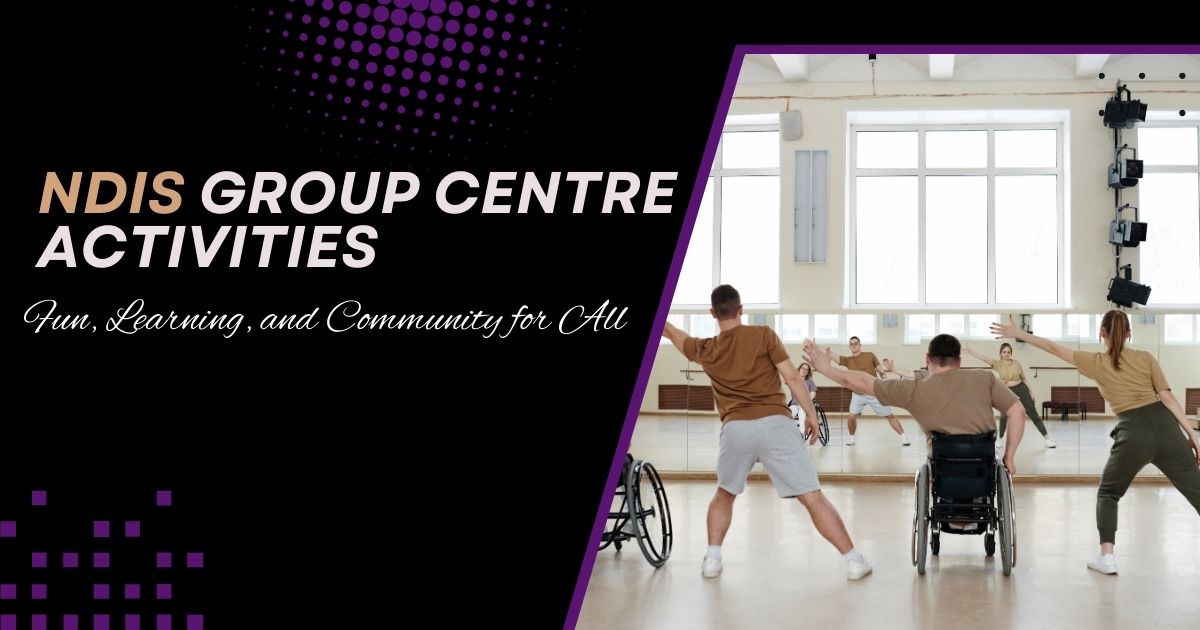The National Disability Insurance Scheme (NDIS) is a support system in Australia designed to help people with disabilities lead fuller, more independent lives. One of the key parts of this support system is Group Centre Activities, which allows individuals to participate in fun, meaningful, and social activities within a group setting. These activities not only encourage learning and skill-building but also create opportunities for socialisation and friendship.
This article will break down what NDIS Group Centre Activities are, how they work, and why they are beneficial for people with disabilities.
What Are NDIS Group Centre Activities?
NDIS Group Centre Activities are structured programs that offer people with disabilities the chance to join group-based activities in a safe, supportive environment. These activities may include art, music, sports, cooking, and outings in the community. Each activity is designed to help people grow, make friends, and learn useful life skills.
These programs are run by trained support workers who make sure participants feel comfortable, stay involved, and learn important skills. Support workers adjust NDIS Group Centre Activities to match each person’s abilities and goals, so everyone can learn and have fun at their own speed.
Benefits of Group Centre Activities
Group Centre Activities have many good effects. Here are some of the top ones:
- Making Friends: These activities help people meet others and make friends. Being around others is good for happiness and can stop people from feeling lonely. In groups, people can practice talking, working with others, and sharing fun moments.
- Learning Skills: People can learn useful skills in these activities. For example, cooking classes show how to make food, and arts and crafts help with creativity. Sports or dance make people fitter and more confident. These skills can help them at home, with friends, or even at work.
- Feeling Good About Themselves: When people finish a project—like a craft, recipe, or sport—they feel proud. This makes them more confident and excited to try new things. Support workers cheer for each person’s progress, which makes everyone feel valued and motivated.
- Staying Healthy and Happy: Being active is good for the body and mind. Activities like dancing, sports, or group walks keep people fit and strong. Fun games or puzzles help the brain stay sharp. Being with others also helps people feel calm, less worried, and happier.
Types of Activities Offered
NDIS Group Centre Activities have many different types to match what people need and enjoy. Here are some common ones:
- Arts and Crafts: Drawing, painting, and making crafts let people show their creativity. These activities also help with hand skills and can make people feel calm and happy with what they create.
- Sports and Physical Activities: Group sports like soccer or basketball help people work together and stay fit. Dance and movement classes are also popular, giving people a fun way to be active and enjoy music.
- Life Skills Training: These classes teach useful skills, like cooking, cleaning, budgeting, and taking care of personal hygiene. Learning these skills helps people do daily tasks on their own.
- Music and Drama: Music and drama are fun ways to be creative. People might learn to play an instrument, sing, or act in a small play. These activities also help build teamwork and confidence.
- Educational and Skill-Building Workshops: Some activities include workshops on reading, math, computer skills, and other helpful skills. These workshops help people become more independent and sometimes even get ready for work.
- Community Outings
Many programs include trips to places like parks, museums, or cafes. These outings give people a chance to practice social skills and enjoy being part of the community.
How to Access Group Centre Activities
To join Group Centre Activities with the NDIS, you’ll need an NDIS plan that includes funding for these supports. This funding might be listed under Capacity Building or Core Supports in your plan.
If you want to get involved, here’s how to begin:
- Check Your NDIS Plan: Look at your NDIS plan to see if it covers group activities. If you’re not sure, ask your NDIS support coordinator or plan manager for help.
- Find a Service Provider: Search for local providers who offer group activities. NDIS participants have a variety of providers to choose from, each offering different programs.
- Talk About Your Goals: Meet with your chosen provider and share your goals, interests, and preferences. They can help you pick activities that suit your needs.
- Get Started: Once you’ve picked your activities, you’re ready to join a group and start participating!
Conclusion
NDIS Group Centre Activities are a wonderful way for people with disabilities to make friends, learn new things, and feel more confident. These programs provide a friendly space where each person can join in at their own pace, with activities that suit their abilities and interests.
Whether it’s sports, cooking, art, or going on outings, these activities help participants grow, learn, and have fun. If you or someone you know could benefit from these programs, looking into NDIS Group Centre Activities could be a great step forward. The support these activities provide can really improve social skills, independence, and overall happiness, making a positive impact on people's lives.






Comments